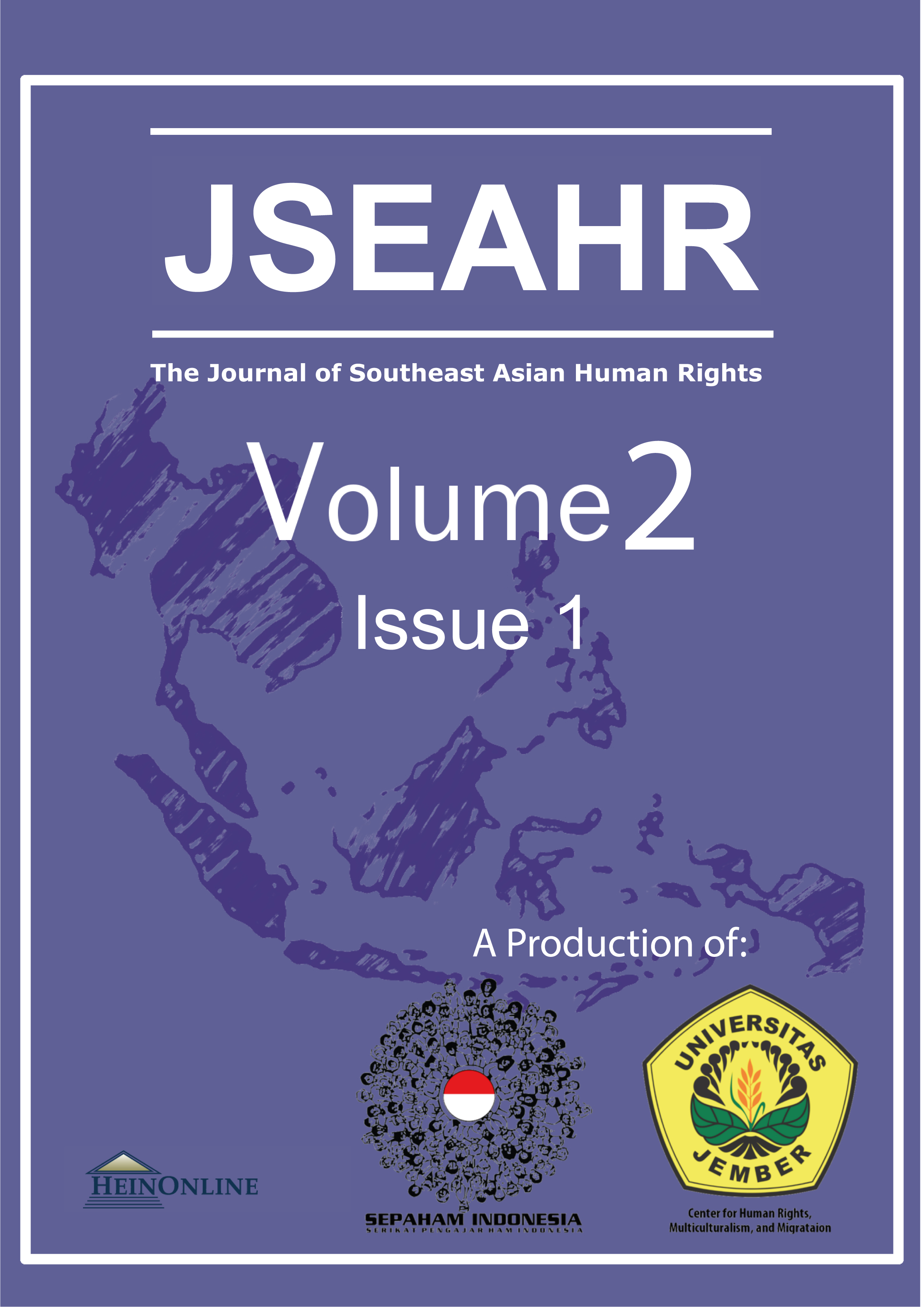Asian Values and Human Rights: A Vietnamese Perspective
DOI:
https://doi.org/10.19184/jseahr.v2i1.7541Keywords:
Human rights, Asian Values, Democracy, Constitution, Communist Party, VietnamAbstract
This paper examines the impact of the ideology of ‘Asian Values' on the legal norms and practices that frame the recognition and protection of human rights in Vietnam. Specifically, the paper focusses on the extent to which Asian Values has been deployed to discourage the adoption of international human rights norms and practices in the context of Vietnam’s rapid economic development since the mid- 1980s. The paper first sketches the adoption of Asian Values in Vietnam’s politics and society. Cultural and political factors that have shaped the conception of human rights are reviewed. Human rights language and norms, as manifest in political ideologies, policies and laws are then analysed, with particular reference to the different versions of Vietnam’s Constitution. It is shown that both the Communist Party of Vietnam (CPV) and the State of Vietnam have clearly articulated Asian Values in formulating their conceptions of human rights. This outcome is argued to result from the fact that Vietnamese political leaders, alike with Lee Kwan Yew in Singapore, the progenitor of Asian Rights, have been strongly influenced by Confucian ideals of governance. Confucianism is not, however, the only basis for political ideas in Vietnam. Although Vietnam is a market economy it remains a one- party state controlled by the CPV. The Marxist-Leninist principles on which the current State of Vietnam was based at its inception in 1975 remain intact. This ideology was however layered onto generations of collectivist principles embodied in the dominant agrarian society. The influence of Asian Values, on the recognition of and support for human rights in Vietnam has, however, been largely negative rather than positive, especially in relation to recognising civil and political rights as codified in universal human rights instruments. Thus, the protection and promotion of human rights in Vietnam, going forward, essentially mandates eliminating the influence of Asian Values in the ideology of political leaders and in the wider society.
Key words: Human rights, Asian Values, democracy, constitution, Communist Party, Vietnam
Downloads
References
Bui, Ngoc Son, Tien Dat Bui & Dang Dung Nguyen. Findings Report of the Research on “Human Rights in the Constitutions of Vietnam†(Vietnam National University Hanoi, 2010).
Bui, Thiem H. “Deconstructing the ‘Socialist’ Rule of Law in Vietnam: The Changing Discourse on Human Rights in Vietnam’s Constitutional Reform Process†(2014) 36:1 Contemp Southeast Asia J Int Strateg Aff 77.
Bui, Xuan Duc. “Chapter on Fundamental Rights and Duties of Citizens in the 1992 Constitution: Shortcomings, Limitations, and Solutions†in Const Theor Pract (Hanoi, Vietnam National University: Hanoi Press, 2011).
Dam, Van Hieu. Fundamental Rights and Duties of Citizens (Hanoi: Legal Publishing House, 1981).
D Barr, Michael. “Lee Kuan Yew and the ‘Asian Values’ Debate†(2000) 24 Asian Stud Rev 309.
Dinh, Quan Xuan. “The Political Economy of Vietnam’s Transformation Process†(2000) 22:2 Contemp Southeast Asia 360.
Elson, R. “Southeast Asia and the colonial experience†in Contemp Southeast Asia (Palgrave Macmillan, 2003).
Evans, M. Embedding market reform through statecraft: the case of equitisation in Vietnam (Ho Chi Minh, 2004).
Gammeltoft, T & R Hernø. “Human rights in Vietnam: exploring tension and ambiguities†in Hum Rights Asian Values Contesting Natl Identities Cult Represent Asia, Democracy in Asia 6 (London: Curzon Press and Nordic Institute of Asian Studies, 2000).
Ghai, Y. Human rights and Governance: the Asia Debate, Occasional Paper 4 (Asia Foundation’s Center for Asian Pacific Affairs, 1994).
Gillespie, John. “Changing Concepts of Socialist Law in Vietnam†in Asian Social Leg Change Dyn Vietnam Chin Reform (Australia: Australian National University Press, 2005).
———. Human Rights and Asian Values (Carnegie Council on Ethics and International Affairs, 2003).
Lien, Ngo Sy. Dai Viet Su Ky Toan Thu (Hanoi: NXB Văn Há»c, 2009).
Luc, Do Tap Kinh. The Book of Six Ways of Liberation (Second Century AD).
Marr, David G. “Concepts of ‘Individual’ and ‘Self’ in Twentieth-Century Vietnam†(2000) 34:4 Mod Asian Stud 769.
Marx, Karl & Engels. Complete Works, book 6 (C.Mác – Ä‚ng ghen, Toà n táºp, Táºp 6) (Hanoi: The National Political Publisher).
Nghia, Pham Duy. “Confucianism and the conception of law in Vietnam†(2004) VNU J Sci Leg Stud.
Nghiem, Dinh Vy & Kim Hai Le. The Declaration of Indepedence and the problem of Human rights (Hanoi: Tap Chi Cong San, 1993).
Nguyen, Minh Tuan & Van Thang Mai. State and law under Post Le Dynasty in protection of human rights (Nha nuoc va phap luat trieu Hau le voi viec bao ve quyen con nguoi) (National University Publisher, 2016).
Pham, Binh Minh. “Việt Nam Äối Thoại Vá»›i Các Quốc Gia Khác Vá» Dân Chủ Và Nhân Quyá»n†(2010) 18 Tap Chi Ly Luan Chinh Tri J Polit Theory.
Sen, Amartya. Development as Freedom (Knopf Doubleday Publishing Group, 2011).
Sen, Amartya Kumar. Democracy as a Universal Value (1999).
Thu, Giang Nguyen D C. Lao Tu Tinh Hoa (Tre Publisher, 2013).
Truong, Trong Nghia. “The Rule of Law in Vietnam: Theory and Practice†in Rule Law Perspect Pacfic Rim (Mansfield Center for Pacific Affairs, 2000).
Tuấn, N M. Những giá trị tÃch cá»±c của Nho giáo trong Bá»™ luáºt Hồng Äức, 4 (Hanoi: Tạp chà Khoa há»c, Äại há»c Quốc gia Hà ná»™i, Chuyên san Kinh tế, 2004).
Vu, C G & K Tran. “Constitutional Debate and Development on Human Rights in Vietnam†(2016) 1 Asian J Comp Law.
Vu, Cong Giao, Minh Tuan Nguyen & Minh Tuan Dang. Report Assessment of the Legislative Development Process in Vietnam since adoption of 2013 Constitution (Hanoi: National Legislative Development Project, 2004).
Vo, Van Ai. “Human Rights and Asian Values in Vietnam†in Hum Rights Asian Values Contesting Natl Identities Cult Represent Asia, Studies in Asian Topics 6 (Routledge, 2000).
Zakaria, Fareed. “A Conversation with Lee Kuan Yewâ€, Foreign Aff (1 March 1994), online: <https://www.foreignaffairs.com/articles/asia/1994-03-01/conversation-lee-kuan-yew>.
Zakaria, Fareed. “Asian Valuesâ€, (2002), online: Foreign Policy <https://foreignpolicy.com/2009/11/09/the-dustbin-of-history-asian-values/>.







